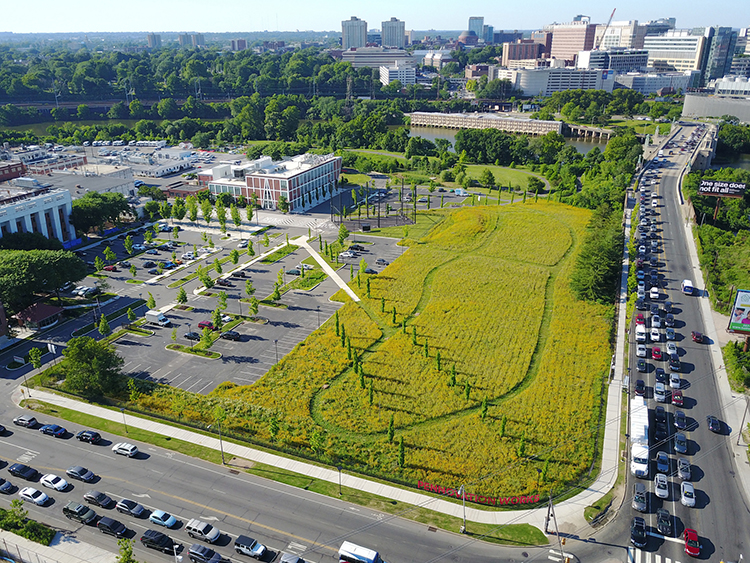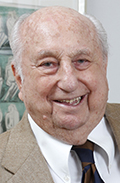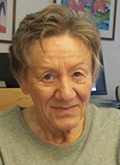Pennovation Works: Where Ideas Go to Work

Year in Review 2018
Pennovation by The Numbers
158,400+ # of square feet leased at the Works site
55,000+ # of square feet acquired from property across the street (~1.25 acres)
85 # of companies in the Works, including at the Pennovation Center
350 # of people working daily within this innovation ecosystem
93 % of office and lab space leased at the Pennovation Center
62 % of dedicated space leased in the newly renovated Office Building
71 # of programs hosted at the Pennovation Center
5,000+ # of attendees at events held at the Works
23,700+ # of complimentary, on-demand shuttle rides made to the site
Backed by the University of Pennsylvania, Pennovation Works is a 23-acre entrepreneurial ecosystem with a central business incubator driving academic research to commercialization. True to vision and just two years from the grand opening, the site has emerged as a sought-after hub for innovation and industry where growing numbers of researchers, entrepreneurs and industry partners are finding fertile ground for propelling solutions forward to some of the most pressing issues of our time.
Members of the Pennovation community enjoy shared equipment and best-in-class facilities, affordable offices, wet labs, Inventor Garages and coworking desks, access to capital resources, top talent and global networks, industry expertise, interdisciplinary collaboration, robust resources and invaluable programming.
This is a look back at the stats, stories and snapshots that shaped an extraordinary year in this ecosystem of innovation, where ideas go to work.
What’s Going On at Pennovation? On Tour
Between the nearly 100% occupied dedicated space inside the business incubator known as the Pennovation Center and the rapidly developing adjacent buildings on the Pennovation Works site, there’s a lot to see at 3401 Grays Ferry Avenue on any given day. Notable visits include guests from as close as the neighborhood and as far afield as South America, Western Europe and East Asia.
- April: In an effort to connect with some of the top startup founders in the region and as a follow-up to his “Rise of the Rest” tour, AOL co-founder Steve Case held a round table discussion and toured the Pennovation Center, making a strong case for continued collaboration citywide.
- April: The Women of Tomorrow Mentorship Program connected 20 Philadelphia high school students interested in career opportunities in STEM fields to female entrepreneurs based at Pennovation.
- May: Research associates from Penn Praxis conducted an on-site Jane’s Walk to showcase Penn’s technology and innovation hub as a centuries-old place of innovation.
- May: Coded by Kids and Blackfynn took a tour of the Center to introduce 50 Fulbright scholars to a major driver behind Philadelphia’s expanding innovation ecosystem.
- June: Select Greater Philadelphia and the City of Philadelphia organized a tour of Pennovation and other innovation hubs in the city for the United States Army as they assessed Philadelphia for their new Futures Command Headquarters.
- August: The Knight Foundation paid a visit to Pennovation to see best practices and increase its understanding of innovation centers as a catalyst for urban economic development.
On the Bandwagon
In 2018, two new partnerships were formed to add a global element to the growing ecosystem of innovation emerging at Pennovation and across the Greater Philadelphia region at large.
- In the spring, site operator Benjamin’s Desk merged with global innovation network 1776, resulting in additional programs with early venture strategy experts and advising opportunities through the UNION platform.
- This summer, The University of Pennsylvania (Penn) and Johnson & Johnson Innovation (JJI) announced their agreement to bring the first JPOD in the nation to Pennovation Works. JPOD @ Philadelphia is a networking hub that includes a secure telecommunications conferencing system to connect regional innovators to the JJI and JLABS network.
Through a portfolio of resident companies and programming available to both Penn-affiliated and Philadelphia-area entrepreneurs, the JPOD @ Philadelphia serves to identify and accelerate the development of early-stage healthcare solutions from the region’s life science ecosystem (Almanac November 6, 2018).
In the fall, just after the two-year anniversary of the Center’s ribbon cutting event, JPOD @ Philadelphia officially launched at Pennovation Works, with nearly 300 select guests and a star lineup of speakers including Penn President Amy Gutmann, Mayor Jim Kenney, Global Head of Johnson & Johnson External Innovation William Hait and Executive Vice President of Global Corporate Affairs Michael Sneed.
In honor of the opening, JJI and JLABS announced the launch of the JPOD @ Philadelphia QuickFire Challenge to engage with innovators working on technologies and solutions with the potential to radically improve human healthcare, with winners to be announced in 2019.
On the Way Up
Pennovation Works serves as a home away from home and ideal facility partner for inventors and researchers from a broad spectrum of disciplines. This year saw significant interest from entrepreneurs in the metro Philadelphia region in laboratory and innovator spaces, as expanding startups sought thoughtfully executed places to land—with collaborative neighbors and facilities and staff nimble enough to accommodate evolving wants and needs. In ideal-use scenarios, start-ups grow from a coworking desk, to an Inventor Garage, to a planned lab, office space, or custom environment in the larger Pennovation Works site. Here are seven of the companies on the way up:
- Drone software platform developer Aerial Applications has used its Inventor Garage to rapidly process drone data into precision maps, and apply drone technology to help proactively manage city electric grids and restore critical power following natural disasters across the country.
- Bioprinter company Allevi entered into a partnership to send a 3D bioprinter to the International Space Station.
- Since April 2018, life science startup Aro Biotherapeutics has expanded their footprint at the Center not once, not twice, but three times. Aro is focused on expediting the development of a dynamic proprietary protein scaffold engineered to allow tissue-specific drug delivery, which has a particularly promising future for cancer treatment.
- Few companies are marching towards the market quite as quickly as Avisi Technologies, a pre-clinical medical devices startup, 2018 Penn President’s Innovation Prize winner and newly inducted JPOD @ Philadelphia resident company. Avisi is advancing the development of a nanoscale ocular implant and novel technology designed to treat glaucoma and cure blindness.
- Following a four-month accelerator for hardware startups in China, IQ Motion Control returned to Pennovation to bring the first drone motor with position sensing to the masses. While the CEO may be behind the World’s Smallest Self-Powered Flying Robot, the company—now a tenant within the large Office Building—no longer occupies the world’s smallest office space at the Center.
- Shortly after leasing two offices and a newly outfitted testing lab at the Center, Philadelphia biotech firm Opertech Bio was named one of 17 startups selected to participate in the renowned food and agriculture accelerator program TERRA, with recognition for their advancements developing technology to improve the process for measuring taste.
- Named a Top 20 Philadelphia Startup on Technical.ly Philly’s realLIST 2018, Tern Water has been making groundbreaking advancements in widespread access to safe and sustainable water. Their flagship product, the Smart Faucet, launched in November 2018.
On the Fast Track
As innovation hubs and incubators emerge as the smart solution for universities, entrepreneurs, researchers and students interested in transforming their creative ideas into viable commercial ventures, Pennovation’s community of innovators continued to push world-class research forward in exciting and unpredictable ways.
- Penn’s School of Engineering & Applied Science embarked on a new project to develop legged robots with the kind of embodied intelligence that will one day allow a parkouring mechanical squirrel to use its limbs as sensors and learn new forms of unprogrammed movement in real time, based on its interactions with its surroundings.
- Researchers at Penn’s Modular Robotics Lab (part of the previously mentioned PERCH) developed SMORES-EP, a robotic system capable of giving autonomous robots the ability to change shape to adapt to challenging environments.
- Pennovation Works company Qualcomm teamed up with PERCH students to create swarms of drones that can navigate on their own and could ultimately save people from peril.
- Under guidance from Dr. Henry Daniell, Professor of Biochemistry and Director of Translational Research at Penn Dental Medicine, and with nearby access to his campus laboratory and Pennovation Works greenhouse, biotechnology startup PhylloZyme advanced its mission to bring plant-produced enzyme products to market and establish strategic alliances with different industrial clients around the globe for pilot level trials.
- Startup Biorealize, the brainchild of a Penn alumna and a researcher in Penn’s School of Design, is well on its way to revolutionizing the future of biofabrication; during Milan Design Week 2018, they partnered with Puma and MIT Design Lab to create an exhibition demonstrating how bacteria can be used within sportswear design to improve performance and sustainability.
- The Center for Environmental Building and Design (CEBD) in Penn’s School of Design constructed a research site to understand ger thermal behavior and identify opportunities to improve comfort, durability and energy performance.
- At the Penn Vet Working Dog Center, rigorous training regimens culminated in canines capable of performing search-and-rescue missions, lending their outstanding olfactory systems to law enforcement, detecting early stage ovarian cancer and even sniffing out stolen antiquities.
On Center Stage
More than 70 programs at the Pennovation Center and around the Plaza attracted 5,000+ attendees. An exciting calendar of events and a commitment to open the doors to the public as often as possible paved the way for visits from venture capitalists, industry leaders, local job seekers, high school students interested in entrepreneurship, future coders, women in technology and more. Numerous others were introduced to the spirit of ground-up innovation now synonymous with Pennovation at industry events and tradeshows. Highlights from 2018 include:
- April 3: 200+ music fans came out for a community concert featuring The Daedalus Quartet as part of an ongoing effort to bring more opportunities in the arts to Pennovation.
- May 1: Penn Medicine’s Dr. Carl June, responsible for the discovery of the first CAR-T gene therapy to be approved by the FDA for cancer, discussed how to sustain momentum in the fight against cancer as well as the current opportunities and challenges in growing the cell and gene therapy sector in Philadelphia. The event was co-hosted by PACT and the Penn Center for Innovation (PCI) as a part of Philly Tech Week #PTW18 and can be viewed here.
- June 9: Hosted in partnership with the Grays Ferry community, the Second Annual South Philly Career Fair connected 350+ people to job opportunities with 80+ vendors.
- June 24: The first Philadelphia Mini Maker Faire at Pennovation Works drew 1,200+ engineers, investors, students and artists interested in celebrating 100+ startups and small businesses with mass production dreams.
- July 21: Following a demanding 24-week program and final project showcase, 45+ newly certified coders graduated from Penn’s College of Liberal and Professional Studies inaugural Coding Boot Camp with a pathway into the tech industry.
- June-July: As part of the first Pennovation Accelerator, the Penn Center for Innovation, PCI Ventures, 1776 and Penn’s Vice Provost for Research’s office selected six early stage ventures to benefit from six weeks of sessions in market research, business planning, team formation and capital strategies.
- July: The Steppingstone Scholars Program, a four-week blended learning initiative on robotics, connected 60+ educationally underserved students in the Greater Philadelphia region to challenging content and tools to achieve academic success.
- September 13: PCI Ventures hosted their Sixth Annual Showcase at the Center to celebrate the progress made by their portfolio and Pennovation member companies and provide a platform for interaction with the larger innovation community.
On the Ground
A drone’s eye view of Pennovation Works showcases a web of flexible and responsive facilities grouped for innovation, technological development and artistic production/exhibition. On the ground, progress made towards the initial vision of a phased approach to development of the site includes:
- As previously mentioned, construction was completed for JPOD @ Philadelphia on the second floor of the Center in fall 2018.
- In Spring 2018, the Pennovation Center began leasing Startup Pods designed for early stage companies with 4-6 people that need their own space, but are still looking for the amenities of an office with the flexibility and low-cost benefits of a coworking desk.
- Recent renovations performed in the 24,000 square foot adjacent office building paved the way for several Pennovation member expansions, including three new leases for Penn Engineering and two custom fit-outs for companies experiencing rapid growth.
- Penn Engineering:
- March: A first floor laboratory was created for the Internet of Things (IoT), complete with multi-use student workstations, testing areas, and conference and lounge spaces.
- June: The Penn Engineering Research and Collaboration Hub (PERCH), established at the Center, took additional space on the first floor of the office building to be able to offer a quiet laboratory space with work desks, private meeting spaces, a lounge area and a kitchenette.
- August: A first floor laboratory was renovated for M. Ani Hsieh (of Penn’s department of mechanical engineering and applied mechanics) to house a large robotics aquatic pool that can generate ocean-like currents and help researchers map the ocean with marine robots.
- Ghost Robotics, a company revolutionizing legged robotics (see the Vision 60 showing off its skills) took additional space in the Office Building to further its advancements in autonomous unmanned ground vehicles.
- Biotech company Limelight Bio extended its operating space to maximize its capacity to develop novel gene therapies focused on enabling the treatment of debilitating inherited diseases that cannot be addressed by existing technologies.
- After undergoing a proposal process, Penn is moving forward with a turn-key development of the Main Lab Building, with anticipated completion (pending final trustee approval) in summer 2020.
- A new 1.25-acre parcel south of Pennovation Works (1201 S. 35th Street) will be acquired in early 2019.
On the Agenda
A bustling neighborhood since the mid-1800s, Grays Ferry continues to experience the upturn in population and business interest occurring in and around the city. Support for a thoughtfully developed commercial corridor benefiting all who work and live in the area continues to grow.
- Following the December 2017 Grays Ferry Healthy Corridor National Study and panel presentation, the Urban Land Institute of Philadelphia moved on several of the recommended steps to foster a healthy Grays Ferry Corridor, from transportation and infrastructure changes to the implementation of strategies designed to support small business growth.
- With the Pennsylvania Department of Environmental Protection’s support, Penn continued efforts to transform the Pennovation Works site. This builds on joint investments in site improvements the year prior by the Philadelphia Industrial Development Corporation and the US Environmental Protection Agency.
- Penn was awarded a million-dollar grant from the state’s Redevelopment Assistance Capital Program (RACP) to advance the redevelopment of the main lab at Pennovation Works. RACP grants are reserved for the acquisition and construction of regional economic, cultural, civic, recreational, and historical improvement projects with multi-jurisdictional impact.
- SEPTA’s Board approved the 2019 addition of Bus Route 49, which will directly connect several neighborhoods to University City and provide easy access to Pennovation from 30th Street Station and Museum Mile.
- Penn Transit Services fielded a record-breaking number of requests for Pennovation’s on-demand shuttle service, with ridership jumping from around 1,600 in January to around 3,000 in July 2018.
On the Front Page
2018 saw a surge in press coverage for Pennovation, ranging from articles profiling community members driving some of the biggest and best breakthroughs in life science, technology and artificial intelligence to podcasts and videos highlighting the University of Pennsylvania’s lead role in harnessing and commercializing the tremendous creative potential in the region.
In a Few Words
This past year, Pennovation Works proved a magnet for people with desire for experimentation and increased knowledge and a passion for translating exciting discoveries into products, ventures and services that will make meaningful improvements to how we live, work and play. The University of Pennsylvania and Pennovation have made great strides bridging intellectual and entrepreneurial initiatives in the name of advancing knowledge, generating economic development and contributing to a regional ecosystem of innovation. More at www.pennovation.upenn.edu
The University of Pennsylvania’s Tax and International Operations Office will again utilize ADP W-2 Services for year-end 2018.
Services Available:
- Access W-2 form information for tax years 2016 and later
- Opt out of printing W-2 (must elect by 12/31 of the current year)
- Receive email notification when a new statement is available to view (must enter email address into ADP)
- Upload W-2 form information directly into tax software
- Online help and FAQ
To Access:
- Login to ADP W-2 Services from the following U@Penn secure web site: https://medley.isc-seo.upenn.edu/penn_portal/u@penn.php
- Click on “My Tax Info” (enter additional security information)
- Click on “Click here for W-2 information for tax years 2015 and later”
- Enter your birthday and the last four digits of your SSN and click “Continue”
Please note that W-2 Forms were mailed to employees’ permanent addresses as it appeared on the Payroll/Personnel File (Employee Database).
If the permanent address was not completed on the Payroll/Personnel File, the W-2 Form was mailed to the current address.
W-2 forms for 2012 and prior will still be accessible under “My Tax Info.”
Contact the Tax Office for W-2 forms for tax years 2013, 2014 & 2015 at (215) 898-6291 or send a request through the Tax Helpdesk at: https://www.finance.upenn.edu:44301/apps/TaxHelpDesk/
An explanation of the contents of the various boxes on the W-2 Form is as follows:
Box a: Employee’s social security number. This is your Social Security Number. It should match the number on your Social Security card. If the number is incorrect, please provide your Social Security card to the Tax Department. The Tax Department will update and issue a corrected W-2 Form.
Box b: Employer identification number (EIN). This is your employer’s identification number assigned by the IRS.
Box c: Employer’s name, address, and ZIP code. This identifies the name, address, city, state and zip code of your employer.
Box d: Control number. This is a code that identifies this unique W-2 Form document in your employer’s records. It is an optional field and may be left blank.
Box e: Employee’s name. This identifies your full name (first name, middle initial and last name). Your name must match the name on your social security card. If the name is incorrect, please provide a copy of the Social Security card to the Tax Department. The Tax Department will update and issue a corrected W-2 Form.
Box f: Employee’s address. This identifies your address, city, state, and zip code.
Numbered Boxes on W-2 Form:
Box 1: Wages, tips, other compensation. Box 1 reports your total taxable wages or salary for federal income tax purposes. This figure includes your wages, salary, tips, reported bonuses and other taxable compensation. Any taxable fringe benefits (such as group term life insurance) are also included in your Box 1 wages. Box 1 does not include any pre-tax benefits such as savings contributions to a 401(k) plan, 403(b) plan, health insurance, or other types of pre-tax benefits.
Box 2: Federal income tax withheld. Box 2 reports the total amount withheld from your paychecks for federal income taxes. This represents the amount of federal taxes you have paid-in throughout the year.
Box 3: Social security wages. Box 3 reports the total amount of wages subject to the Social Security tax for 2018. The Social Security tax is assessed on wages up to $128,400 (for 2018). This limit is called the Social Security wage base.
Box 4: Social security tax withheld. Box 4 reports the total amount of Social Security taxes withheld from your paychecks. The Social Security tax is a flat tax rate of 6.2% on your wage income, up to a maximum wage base of $128, 400 (for 2018). Wages above the Social Security wage base are not subject to the Social Security tax. Accordingly, the maximum figure shown in Box 4 should be $7,960.80 ($128,400 maximum wage base times 6.2%).
If you have two or more jobs during the year and your total Social Security wages (Box 3) exceeds $128,400, you may have paid-in more Social Security tax than is required. You claim the excess Social Security tax withholding as a refundable credit on your Form 1040.
Box 5: Medicare wages and tips. Box 5 reports the amount of wages subject to the Medicare tax. There is no maximum wage base for Medicare taxes.
Box 6: Medicare tax withheld. Box 6 reports the amount of taxes withheld from your paycheck for the Medicare tax. The Medicare tax is a flat tax rate of 1.45% on your total Medicare wage under $200,000. Employees whose Medicare wages are over $200,000 will be subject to an additional withholding for the additional Medicare Tax at a rate of 0.9% on Medicare wages over the $200,000. This is a rate of 2.35% on all Medicare wages over $200,000.
Box 10: Dependent Care benefits. Shows the total dependent care benefits under a dependent care assistance program paid or incurred by the employer for the employee and amounts paid or incurred for dependent care assistance in a section 125 (cafeteria) plan. It may include the amounts paid directly to a daycare facility by the employer or reimbursed to the employee to subsidize the benefits, or benefits from the pre-tax contributions made by the employee under a section 125 dependent care flexible spending account. Any amounts over $5,000 are also included in boxes 1, 3, and 5.
Box 12: Deferred Compensation and Other Compensations. There are several types of compensation and benefits that can be reported in Box 12. Box 12 will report a single letter or double letter code followed by a dollar amount. A complete list of the codes can be found on the box instructions on the W-2 Form. These are the most common codes found on Penn’s W-2 Form.
- Code C: Taxable cost of group term-life insurance over $50,000. This amount is included as part of your taxable wages in Boxes 1, 3, and 5.
- Code E: Non-taxable elective salary deferrals to a 403(b) retirement plan.
- Code G: Non-taxable elective salary deferrals and employer contributions (including non-elective –deferrals) to a Section 457(b) retirement plan.
- Code M: Uncollected Social Security or RRTA tax on taxable group term life insurance over $50,000.
- Code N: Uncollected Medicare tax on taxable group-term life insurance over $50,000.
- Code P: Excludable moving expense reimbursements paid directly to a member of the armed forces (not included in Box 1, 3, or 5).
- Code T: Employer paid adoption benefits. This amount is not included in Box 1 wages. Use form 8839 to compute any taxable and nontaxable amounts.
- Code W: Employer and employee contributions to a Health Savings Account.
- Code Y: Salary deferrals under a Section 409A non-qualified deferred compensation plan.
- Code Z: Income received under 409A non-qualified deferred compensation plan. This amount is included in taxable wages in Box 1. This amount is subject to an additional tax reported on the employee’s Form 1040.
- Code BB: After-tax contributions to a Roth 403(b) retirement plan.
- Code DD: Reports the cost of employer-sponsored health coverage. The amount reported with Code DD is not taxable
Box 13: Checkboxes. There are three checkboxes in Box 13. The only box that may be checked off that applies to you as an employee of the University is the Retirement Plan.
Retirement plan means that you participated in your employer’s retirement plan.
If the “Retirement plan” box is checked, special limits may apply to the amount of traditional IRA contributions you may deduct. See Pub. 590, Individual Retirement Arrangements (IRAs).
Box 14: Other Tax Information. Your employer may report additional tax information in Box 14. If any amounts are reported, they will have a brief description of what the amounts are for. For example, SUT represents the amount of State Unemployment Tax which was withheld from your earnings during the year.
Box 15: State and State Employer’s Identification. Box 15 reports the state and your employer’s state tax identification number.
Box 16: State wages. Box 16 reports the total amount of taxable wages earned in that state. You may have multiple state W-2 forms if you worked in other states during the year.
Box 17: State income tax withheld. Box 17 reports the total amount of state income taxes withheld from your paychecks for the wages reported in Box 16.
Box 18: Local wages. Box 18 reports the total amount of wages subject to local income taxes. You may also have multiple local W-2 forms if you worked in more than one locality during the year.
Box 19: Local income tax withheld. Box 19 reports the total amount of taxes withheld from your paychecks for local income taxes.
Box 20: Locality name. Box 20 provides the name of the locality where the tax is being paid.
—Victor Adams, Tax and International Operations
2019 Payroll Tax Updates
Federal Taxes: The federal withholding tax tables for 2019 can be found in the IRS Publication 15 at: http://www.irs.gov/pub/irs-pdf/p15.pdf
Social Security Wage Rate: The 2019 Social Security wage base is $132,900.
Social Security Tax Rate: The 2019 tax rate remains at 6.2% and the maximum tax that an employee would pay will be $8,239.80.
Medicare Tax Rate: The Medicare tax rate remains at 1.45% in 2019 for wages under $200,000. Wages in excess of $200,000 are taxed at 2.35%.
PA State Unemployment Insurance Employee Rate: The tax rate remains at 0.06% for 2019.
PA State: The tax rate for 2019 remains at 3.07%.
Philadelphia City: As of July 1, 2018, the Resident Rate is 3.8809% and Non Resident Rate is 3.4567% and remains the same for the beginning of 2019.











